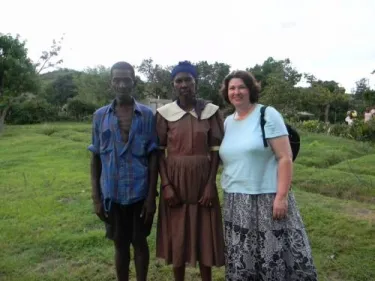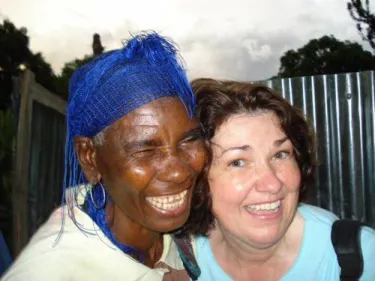Listen, and You Will Receive So Much in Return
A Letter from Cindy Corell, serving in Haiti
Listen.
That was the first and best advice I received about being with the people of Haiti.
Now, as a mission co-worker hosting groups visiting Haiti, some for the first time, I try to explain the importance of listening. And when I do, I often remember the lessons I learned when I listened on my very first trip.
It was June 2010. I was going to Haiti with a group of Episcopalians to meet our partners in mission: the priest, lay pastors and members of a small church in Cerca-la-Source near the border with the Dominican Republic.
I did my best to practice listening. I had been studying Haitian Creole for six months before traveling to Haiti for the first time. And I was a journalist, accustomed to asking good questions and carefully absorbing the information in response.
Still it was difficult. With my burgeoning Kreyòl, I had to concentrate on each sound, each syllable, and still I missed so much.
St. Marc Episcopal School in Cerca-la-Source owned a piece of land outside of town, and while we visited, Pere Walin, the priest, took us to see the property. It was there that my intent to listen was greatly rewarded.
The group of us, nine Americans and a few Haitians, walked to the top of the grass-covered hill. We walked past a small garden with corn and peanuts and under the tallest avocado tree I’ve seen.
After about 20 minutes at the farm, the rest of the group was already near the vehicles ready to go back to town. I still was on top of the hill taking pictures, taking my time.

That’s when Joselyn introduced herself to me in typical Haitian fashion. She embraced me. No warning. She embraced me, and as we walked down the hill together, she asked me about myself, and she patiently listened as I tried to speak in her language.
She was about 40 years old. She wore a brown cotton dress and royal blue crocheted scarf on her head. She and her husband farm the land owned by St. Marc School in Cerca-La-Source. They raise the corn and pistachios and harvest the huge avocados. She listened as I tried to tell her that I grew up near cornfields, that I knew what hard work it was to make the gardens.
She nodded and answered my question. What was lost in language translation was gained in embrace. We were still holding hands when we reached the bottom of the hill.
That’s what Haiti does, you know. She embraces you. Out of nowhere, when you are least expecting it, this small impoverished country shares with you her painful yet beautiful history, her scarred but beautiful landscape, her struggling yet beautiful people.

Later that evening, I saw Joselyn again in church. She’d changed into a lovely dress and wore two wide-brimmed hats, one white, the other navy blue.
And when I returned to Cerca-La-Source the next year, there was Joselyn waiting by the cornfield. When I got out of the Jeep, she embraced me. Again. She remembered me.
Joselyn reminds me still what gifts I gain when I offer respect and listening interest in the lives of others.
Gifts like what, even without words, Joselyn gave:
I am glad for your presence, not your gifts.
I want you to know who I am.
I thank God for you.
I want you to know my people, even the ones too small to make their presence known.
I want you to know that though we struggle, we care for one another and make the best of what we have
I want you to come again.
I will remember you.
We have so much to gain when we spend time with people so different from ourselves. I hope that you are finding that experience in the ways you travel into different neighborhoods, different places. I am grateful for all that you have given in supporting my being able to live in Haiti. I invite you into this place, and I invite you to continue your prayerful, financial and in-person support of our ministry here.
